BARC (Broadcast Audience Research Council) India and Nielsen jointly launched today, 27 March, a special report- COVID-19 IMPACT: WHAT’S HAPPENING IN THE TV & SMARTPHONE LANDSCAPE, to understand the changes in consumption behaviours of TV and Smartphones, given the COVID-19 pandemic lockdowns.
The Coronavirus outbreak has created an unprecedented situation and temporary slowdown all across the globe. With 21 days lockdown in place, as declared by PM Narendra Modi on 24 March, people of India have quarantined themselves at home till 14 April. This declaration news alone garnered an unprecedented viewership of 197 million
people watching it on television across the country.
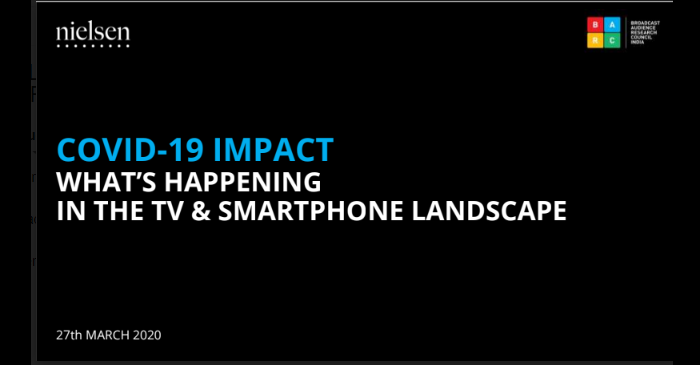
Many organisations have shut down operations partially or fully, while others have advised its employees to work from home (WFH). With outdoor access and entertainment being restricted at the moment, citizens have naturally turned towards indoor entertainment and unlimited content consumption.
Hence, BARC India, which is the official currency on Television Measurement in India and Nielsen, which runs a 12000 strong smartphone panel passively capturing smartphone behaviour, collaborated to track the nature of content consumption across genres.

Presenting the report jointly with Nielsen Global Media South Asia country leader Dolly Jha, BARC India chief executive officer Sunil Lulla said in the webinar, “These are unfortunate and unprecedented times. Working closely with Nielsen, we bring for our customers and stake-holders, this very significant and important update, on change in content and advertising consumption behaviour, with a significant population at home. We will report soon enough, the impact of total lockdown. Our respective brave teams are working from home, round the clock to ensure the TV measurement currency, continues uninterrupted.”
Television viewing is an integral part of the Indian ethos. An average Indian is known to spend a considerable number of hours every day on TV. So, it is quite expected that sudden and forced confinement will lead to changes in TV consumption behaviour.
During the COVID-19 disruption period (16 to 22 March), Kids genre surged with 20 per cent of daily average reach, second only to News, which stood at 64 per cent daily average reach. Movies followed the kids genre with 10 per cent of daily average reach, contributing to the growth in TV viewing.
Apart from the animated kids content on TV that are carefully crafted and curated by kids broadcasters, kids during this sudden homebound period, also consumed a lot of news being around their parents and elders. While they consumed 40 per cent of content targeted to them, they consumed 83 per cent of news, which is remarkable.
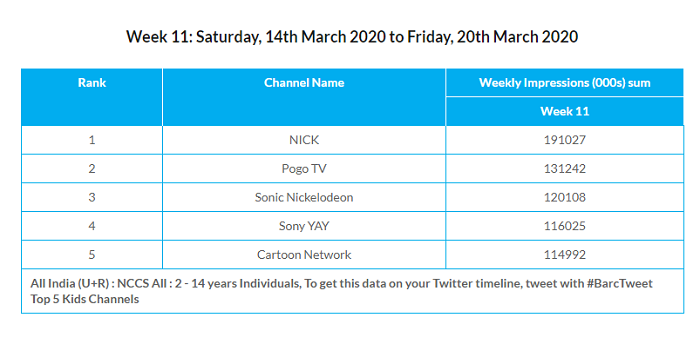
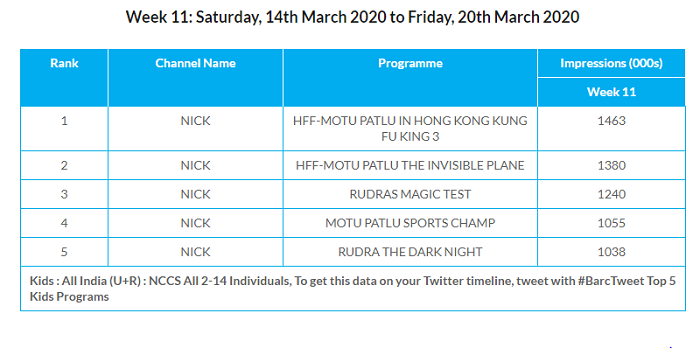
Also as BARC India reports, within the time period of 14 to 20 March, Nickelodeon remains the defending champions of the ‘Top 5 Channels’, followed by POGO, Sonic Nickelodeon, Sony YAY! and Cartoon Network.
In the ‘Top 5 programmes’ category Nick and Sonic again rules with all its shows on the charts. Clearly Motu Patlu and Rudra have reigned the hearts of the younger audience.
Besides TV viewing, another thing that keeps people hooked, in fact much more than TV, is a smartphone. Gone are the days when a mobile phone was used solely for communication. People today depend on their smartphones not just for social interactions, but also for entertainment, online video consumption, banking and financial transactions, purchase of daily need goods like groceries, personal care to durables. It is but natural that this period of forced confinement would also bring some change in the way people use their smartphones.
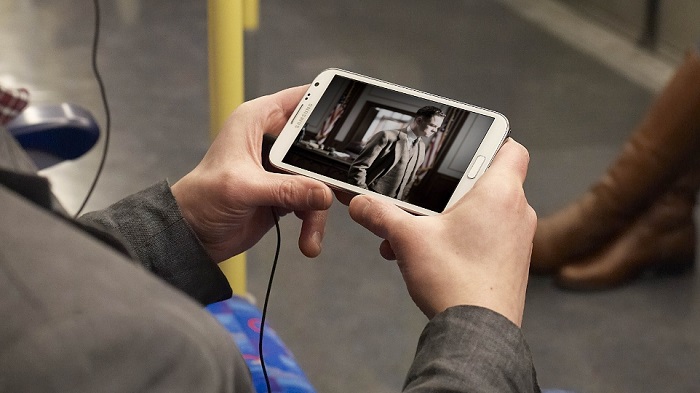
The online video on demand sector has grown exponentially in India over the past couple of years. Maximum video content is streamed and watched on smartphones. So much so that, global streaming powerhouse, Netflix introduced a mobile-only plan for Rs. 199 for the Indian market in late 2019.
As the BARC and Nielsen report further states, the online VOD (streaming) sector witnessed a whopping 96 per cent users per week with 219 minutes spent per user per week, which is a 3 per cent increase during the COVID-19 disruption period.
Overall, the time spent on smartphone in week one of COVID-19 disruption has increased by 1.5 hours.
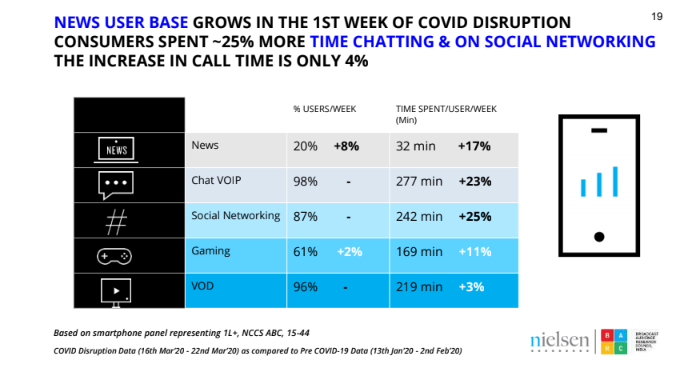
There have reports that suggest, 69 per cent of internet users had used one or more entertainment or video apps during the last one month. Indians spent 3000 million hours on entertainment consumption in 2019, and video viewers increased by 16 per cent to reach 378 million, which is around 96 per cent of smartphone owners and they are expected to grow to 488 million by 2022. So, though COVID-19 has acted as a catalyst in the accelerated growth of VOD consumption on smartphones, its growth rate has been remarkable. However, 94 per cent of those who consumed content online also subscribed to linear television services.

Commenting on the tremendous smartphone usage during the COVID disruption period, Jha told Animation Xpress, “The usual time spent is about 220 to 240 minutes in a week in this category. What we have done is looked at last week’s data and tried to see and find out how it has spiked or changed versus January, which we’re using as a reference as the pre-COVID disruption period. In the OTT space, we’ve a big sporting app sitting there. We did have sporting events in January, therefore when you compare it with now, the kind of increase we’re seeing is that of 3 per cent. But if we have to disregard that particular period and take out January, and compare it with the preceding week, that’s the week earlier to the last week we have taken as the COVID disruption period, increase is going to be a little higher.”
She also added that news consumed on any OTT platform is also calculated and considered under the OTT consumption and viewership.
So while we’re all quarantined at home, entertainment around these sectors are surely keeping audience engaged and providing them respite amidst all the chaos and anxieties.
